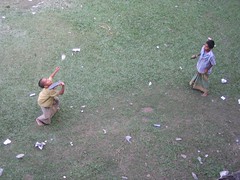Anju invited me over to her house this afternoon. I told her I’d go straight after my walk, so we decided I’d go at about 5pm.
I purposely ate a pretty big lunch, because I figured that combined with the usual cha, biscuits and other snacks that Anju would be likely to feed me, I wouldn’t need to eat any dinner.
I arrived at Anju’s at 5pm as planned. I was immediately swamped with family members, kids and other unknown village people; told to “boshen” (sit down) on a wooden chair; handed the obligatory glass of “dub” (green coconut water); and yelled at in Bangla in the hope that by doing this I would understand more easily. Anju’s family always has the most wonderful of intentions, but they tend to come across quite aggressively and I definitely have to be in the mood for it whenever I go to her house – her family are quite intense and I think they’d actually like to keep me.
Luckily I was in the mood today.
One thing was missing today though. Biscuits… chanachur… bananas… Where was all the food? I thought maybe Anju had relaxed her hospitality practices – much to my delight – I was still full from my lunch. I thought I’d take advantage of this by casually laying the groundwork for myself by saying that I MUST leave before dark (these days, it’s around 5.30). Anju said that’d be fine.
A little while later, Anju took me inside her house, where I was given the (again, obligatory) cup of cha. But still no food! I was impressed. As I drank my cha, I looked around Anju’s house. I was interested, although not entirely surprised to notice that there were lots of things around the room that had once been in my garbage bin. Things such as the cheap, rusty cheese grater that I’d bought when I first moved in; a thin-based frypan that burnt everything I cooked in it for the first month or so; and my horribly mouldy bamboo mat. I wondered what Anju and her family must think of me – throwing these things out when, to them, they are still perfectly useable. Never in my life have I been so aware of my innate materialistic nature than I was at this moment.
So, with tea cup empty and tail firmly between my legs, I said in my most assertive voice and best Bangla I could manage, “Anju, I have to go now.”
“OK, just come into this room for a minute.”
I was led into another bedroom and told to “Boshen” on the bed (minus a mattress). The next thing I know, I’m being handed a plate piled high with rice and told to wash my hand.
Nooooooo!!!!!!!!!! I CAN’T stay for dinner! I have to GO!! Grrrrrr!!!!
“Anju! You are SO naughty! I told you I have to go. You didn’t tell me you were inviting me over for dinner!”
“I know, but if I had’ve asked you for dinner you would have said no.”
That shut me up. I probably would have. But she’s very cheeky.
So that was that. Her mum gave me 4 huge pieces of chicken. Anju and I ate together, along with her younger brother, Jackir, who she’s been wanting me to meet for ages, her sister and mum and dad, which is quite special – this goes completely against custom: usually the guest eats with the men first and the women serve the food and eat hours later. The food was delicious, and I didn’t even need Anju’s encouraging calls of “Khao” (Eat!) every couple of minutes – not until I got to the drumstick and reached my limit. At this point, I pleaded with Anju to let me leave the unfinished chicken, for I knew there was more food coming. But she again told me to “khao” and she pulled the meat off the bone for me, gave the bone to her mother to dispose of, and told me to “khao” once more.
Next came fish, and once again, Anju felt obliged to take the meat off the bones for me – but I felt a little bit like a child being fed by my mother, so I told her to stop – my dignity was at stake here.
Eventually, somehow, the contents of my plate ended up in my belly and Anju was finally satisfied that she had successfully had me over for dinner.
One of the most fortunate customs in Bangladesh is that it’s ok to leave as soon as you’ve finished eating, so I told Anju that now, I definitely had to go. At this point, I was ushered into the third (and final) room of the house, where some more relatives had mysteriously appeared and were sitting waiting for me to talk to. We chatted small talk for a little while, and once I felt that my duty had been done there, I looked pleadingly into Anju’s eyes and said that I really had to go.
Thankfully, she released me. I walked outside, where I said goodbye to Jackir. At this point I experienced another break with custom. Anju instructed her brother (a 20-year-old young man) to shake my hand. This type of behaviour is also unheard of, especially for village people – so I was most impressed with Anju for being such a progressive older sister and good role model for her brother.
Anju and her dad walked me all the way home – Anju with her arm around me the whole time and her dad on torch duties.
Yet another memorable experience to write home about.

